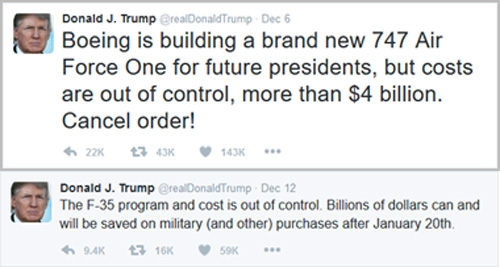| -- | December 20, 2016 Have the Trump Tweets Ruined the Defense Sector? By Patrick Watson This month, President-elect Trump annoyed some people when he criticized two top defense contractors on Twitter.  Wall Street isn’t used to presidents publicly criticizing major US companies. The tweets caused shares to tumble a few points for both Boeing (BA) and Lockheed Martin (LMT), which makes the F-35 fighter planes. The stocks recovered quickly, but the sudden moves gave traders a few frantic minutes. Within the same week, Trump also shared a Washington Post article about a study that exposed enormous bureaucratic waste at the Pentagon.  According to the article, the Pentagon buried the study because it feared “Congress would use the findings as an excuse to slash the defense budget”: Pentagon leaders had requested the study to help make their enormous back-office bureaucracy more efficient and reinvest any savings in combat power. But after the project documented far more wasteful spending than expected, senior defense officials moved swiftly to kill it by discrediting and suppressing the results. […] For the military, the major allure of the study was that it called for reallocating the $125 billion for troops and weapons. Among other options, the savings could have paid a large portion of the bill to rebuild the nation’s aging nuclear arsenal, or the operating expenses for 50 Army brigades. But some Pentagon leaders said they fretted that by spotlighting so much waste, the study would undermine their repeated public assertions that years of budget austerity had left the armed forces starved of funds. Instead of providing more money, they said, they worried Congress and the White House might decide to cut deeper. So, the plan was killed. The Pentagon imposed secrecy restrictions on the data making up the study, which ensured no one could replicate the findings. A 77-page summary report that had been made public was removed from a Pentagon website. This doesn’t surprise me in the least. Anyone who has been in the military knows about wasteful spending. A few months ago, I told our Macro Growth & Income Alert subscribers how, as a lieutenant, I had dozens of expensive vehicles forced on me. I had no troops to drive them and no place to park them. It didn’t matter. Someone up the chain had orders to spend millions of dollars on those vehicles and send them my way, so that’s what he did. Every military officer has similar stories, so Trump is absolutely right about Pentagon waste. I’m convinced it costs lives too: Other units had to make do without urgently needed resources while I was getting Humvees jammed down my throat. Such things don’t happen in the private sector (at least not as often) because corporations must show a profit. The Pentagon doesn’t… nor should it. When you think about it, all defense spending is economically irrational. Governments spend billions preparing for wars they hope to never fight. It’s kind of a very expensive insurance—we have to defend the nation from potential enemies, whatever it costs. That simple fact gives military spending a natural upward bias. Combine that bias with bureaucratic inefficiency and the cleverness of defense contractors, and the result is… well, what we have. The Trump administration will have a hard time changing it. That F-35 program, for instance, is directly responsible for thousands of jobs in virtually every congressional district. The contractors arranged it that way on purpose. Canceling the F-35s might be the right move, budget-wise, but it would have serious political side effects. 
F-35 first flight. Photo: Lockheed Martin No Way but Up President Eisenhower was way ahead of his time when he warned about the “military-industrial complex.” He knew from experience how political forces could make defense spending spin out of control. It is truly insane and no one has been able to change it. Will Trump have better luck? Maybe, though choosing retired USMC General James Mattis as secretary of defense doesn’t give me confidence. Mattis barely had his uniform off when he took a high-paying board seat with leading defense contractor General Dynamics (GD) in 2013. But I could be wrong; some people say Mattis was a good general. Maybe he learned something from that private-sector experience that will help him rein in the contracting beast. I hope so—but I’m not going to bet on it. No, the far better bet is that defense spending will remain strong and probably grow after Mattis and Trump take command. They may change priorities, but I can’t see them spending any less. That being the case, I think it is a mistake to interpret those Trump tweets as a sign that defense spending is on a downhill slide. In fact, the opposite is much more likely. 
Photo: Getty Images The All-Weather Sector It’s true that the US has the world’s largest defense budget, but other countries spend a lot too… and they will have to spend even more if Trump gets the US’s NATO allies to shoulder more of the financial burden. I also bet Trump will not-so-subtly suggest they buy American products, which will offset any revenue loss from lower Pentagon spending. I’ve been bullish on defense for a long time. It is the closest I’ve found to an all-weather sector, and I believe it will stay that way. Global peace and harmony aren’t on the horizon yet. By way of disclosure, I should mention that both Boeing and Lockheed Martin are in the current Yield Shark model portfolio. In Macro Growth & Income Alert, which I co-edit with Robert Ross, last week our subscribers took an 11.4% profit on an option trade in shipbuilder Huntington Ingalls (HII). We also hold a small-cap foreign stock that supplies drone aircraft and other useful platforms to many different countries. If you have second thoughts about investing in defense stocks, I understand. In an ideal world, no one would have these kinds of “opportunities.” On the other hand, we don’t have an ideal world (and probably never will). So, when reality hands you a lemon, there’s nothing wrong with making lemonade. Now is your chance. See you at the top,  Patrick Watson P.S. If you’re reading this because someone shared it with you, click here to get your own free Connecting the Dots subscription. You can also follow me on Twitter: @PatrickW.
 | Subscribe to Connecting the Dots—and Get a Glimpse of the Future
We live in an era of rapid change… and only those who see and understand the shifting market, economic, and political trends can make wise investment decisions. Macroeconomic forecaster Patrick Watson spots the trends and spells what they mean every week in the free e-letter, Connecting the Dots. Subscribe now for his seasoned insight into the surprising forces driving global markets. |
 Senior Economic Analyst Patrick Watson is a master in connecting the dots and finding out where budding trends are leading. Patrick is the editor of Mauldin Economics’ high-yield income letter, Yield Shark, and co-editor of the premium alert service, Macro Growth & In come Alert. You can also follow him on Twitter (@PatrickW) to see his commentary on current events. Senior Economic Analyst Patrick Watson is a master in connecting the dots and finding out where budding trends are leading. Patrick is the editor of Mauldin Economics’ high-yield income letter, Yield Shark, and co-editor of the premium alert service, Macro Growth & In come Alert. You can also follow him on Twitter (@PatrickW) to see his commentary on current events. Share this newsletter
  
Use of this content, the Mauldin Economics website, and related sites and applications is provided under the Mauldin Economics Terms & Conditions of Use. Unauthorized Disclosure Prohibited The information provided in this publication is private, privileged, and confidential information, licensed for your sole individual use as a subscriber. Mauldin Economics reserves all rights to the content of this publication and related materials. Forwarding, copying, disseminating, or distributing this report in whole or in part, including substantial quotation of any portion the publication or any release of specific investment recommendations, is strictly prohibited.
Participation in such activity is grounds for immediate termination of all subscriptions of registered subscribers deemed to be involved at Mauldin Economics’ sole discretion, may violate the copyright laws of the United States, and may subject the violator to legal prosecution. Mauldin Economics reserves the right to monitor the use of this publication without disclosure by any electronic means it deems necessary and may change those means without notice at any time. If you have received this publication and are not the intended subscriber, please contact service@mauldineconomics.com. Disclaimers The Mauldin Economics website, Yield Shark, Thoughts from the Frontline, Patrick Cox’s Tech Digest, Outside the Box, Over My Shoulder, World Money Analyst, Street Freak, Just One Trade, Transformational Technology Alert, Rational Bear, The 10th Man, Connecting the Dots, This Week in Geopolitics, Stray Reflections, and Conversations are published by Mauldin Economics, LLC. Information contained in such publications is obtained from sources believed to be reliable, but its accuracy cannot be guaranteed. The information contained in such publications is not intended to constitute individual investment advice and is not designed to meet your personal financial situation. The opinions expressed in such publications are those of the publisher and are subject to change without notice. The information in such publications may become outdated and there is no obligation to update any such information. You are advised to discuss with your financi al advisers your investment options and whether any investment is suitable for your specific needs prior to making any investments.
John Mauldin, Mauldin Economics, LLC and other entities in which he has an interest, employees, officers, family, and associates may from time to time have positions in the securities or commodities covered in these publications or web site. Corporate policies are in effect that attempt to avoid potential conflicts of interest and resolve conflicts of interest that do arise in a timely fashion.
Mauldin Economics, LLC reserves the right to cancel any subscription at any time, and if it does so it will promptly refund to the subscriber the amount of the subscription payment previously received relating to the remaining subscription period. Cancellation of a subscription may result from any unauthorized use or reproduction or rebroadcast of any Mauldin Economics publication or website, any infringement or misappropriation of Mauldin Economics, LLC’s proprietary rights, or any other reason determined in the sole discretion of Mauldin Economics, LLC. Affiliate Notice Mauldin Economics has affiliate agreements in place that may include fee sharing. If you have a website or newsletter and would like to be considered for inclusion in the Mauldin Economics affiliate program, please go to http://affiliates.pubrm.net/signup/me. Likewise, from time to time Mauldin Economics may engage in affiliate programs offered by other companies, though corporate policy firmly dictates that such agreements will have no influence on any product or service recommendations, nor alter the pricing that would otherwise be available in absence of such an agreement. As always, it is important that you do your own due diligence before transacting any business with any firm, for any product or service. © Copyright 2016 Mauldin Economics | -- |
